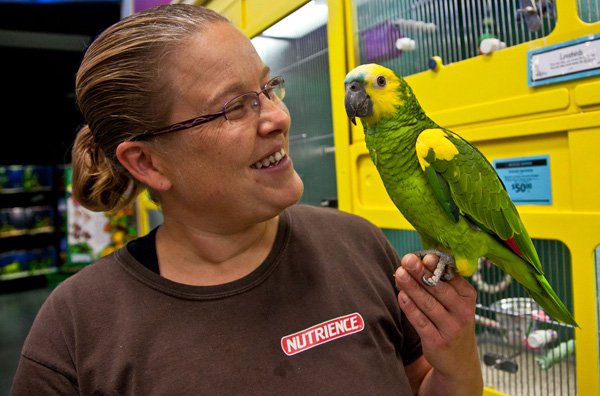
Just about everyone who has, or has had, a dog, has either thought or said that or something close to it. Over the years every dog I’ve had has thrown up at one time or another. For some it was a weekly thing and others hardly ever.
We had a dog named Shelly that we got from a shelter. She was probably about 2 yrs old when we got her so what she did before that we don’t know but in all the years we had her she only threw up once. Right on the brand new couch.
A dog vomiting is a pretty common occurrence. Most of the time it’s caused by eating something they shouldn’t have. As they walk around the yard, or even while you’re out walking them their nose is to the ground and anything that looks interesting like a leaf, a pebble, paper or plastic wrappers, sticks, I could go on and on, they have to check it out and put it in their mouth. It can also be caused by overfeeding, which can also cause diarrhea. It is amazing the things dogs will eat.
These are some reasons that your dog may be vomiting. -They eat too fast. I’ve never seen a dog eat slowly, savoring the flavor of each bite. -Change in their diet. You should change food gradually. -Obstructing objects. Where did the super ball go? If it blocks the path to the intestines it can cause vomiting.
It’s not one of those, what else could it be? -Middle and Inner Ear Disease. They could have an infection in their inner ear that can affect their balance. They will normally scratch their ear or shake their head. -Pancreatitis. Vomiting could be caused by inflamed pancreas. -Heat Stroke. Dogs cannot cool themselves as efficiently as we do. They can overheat easily in the hot summer. -Motion Sickness. They can get motion sickness just like we do, although they usually get used to it. -Liver Disease. Your vet will check for liver enzyme levels. Consistently high possibly could mean a liver problem. -Parasites. Puppies frequently get parasites like worms. A large number would most likely cause a potbelly and would cause vomiting.
What did they throw up? This can give important clues. -If the vomit is high in mucus, the stomach or high intestine is inflamed. -Undigested food could be simply overeating but could indicate food poisoning. -Flecks of bright red blood could be from a sore in their stomach. -If there is what looks like coffee grounds it could be dried blood which would indicate a problem farther down the digestive tract. -Strong odor could indicate a blockage. -Pieces of paper, tin foil, sticks would mean they found something that they thought was interesting enough to eat it. Easily treatable as long as it doesn’t damage anything inside.
Many objects that initially cause vomiting are eventually passed in the stool. I’ve seen a full size super ball in the poop of a Lab. Throwing up can empty the stomach of things that could be the cause like spoiled food, leaves etc.
Treating your dog’s vomiting. Vomiting is not a cause, it is a reaction to something. So the treatment will be based on the cause. If your just occassionly throws up and otherwise seems perfectly normal then you probably don’t have to treat it. Vomiting in dogs is not nearly the traumatic event it is in humans and is quite common in dogs.
If the vomiting is acute, don’t feed them for 24hrs. Keep fresh water available and after 24hrs give them small amounts of a bland diet, like boiled rice and hamburger. You can give them small amounts more often instead of big feedings.
Dehydration is a concern for any animal that is vomiting. If your dog is continually throwing up, and can’t even hold down water, you should take them to the vet immediately. This could be a severe problem, like an obstruction, that could possibly need surgery. If they can hold down water and are only vomiting occasionally, then you can try the home remedies of smaller meals of the bland diet.
Though treating the symptom itself will often improve their comfort, if you believe the problem may be serious it is better to be safe than sorry and get your dog to your veterinarian for the correct diagnosis of the underlying cause.
Brad has worked with dogs for over 30yrs. He has information on other dog health problems and tips on puppy training at absotivelydogs.com
 Pet Insurance - Is The Cost Really Worth It?
Pet Insurance - I
Pet Insurance - Is The Cost Really Worth It?
Pet Insurance - I
 Subtle Symptoms Of Ill Health In Dogs
Subtle Symptoms O
Subtle Symptoms Of Ill Health In Dogs
Subtle Symptoms O
 What Type Of Pet Is Right For You?
What Type Of Pet
What Type Of Pet Is Right For You?
What Type Of Pet
 Why Shouldn’t Dogs Eat Cat Food - An In-depth Examination
Why Shouldn’t Dog
Why Shouldn’t Dogs Eat Cat Food - An In-depth Examination
Why Shouldn’t Dog
 Choose Best Automatic Pet Feeders Interms Of Design, Setup, Cleaning
Choose Best Automatic Pet Feeders Interms Of Design, Setup,
Choose Best Automatic Pet Feeders Interms Of Design, Setup, Cleaning
Choose Best Automatic Pet Feeders Interms Of Design, Setup,
Copyright © 2005-2016 Pet Information All Rights Reserved
Contact us: www162date@outlook.com